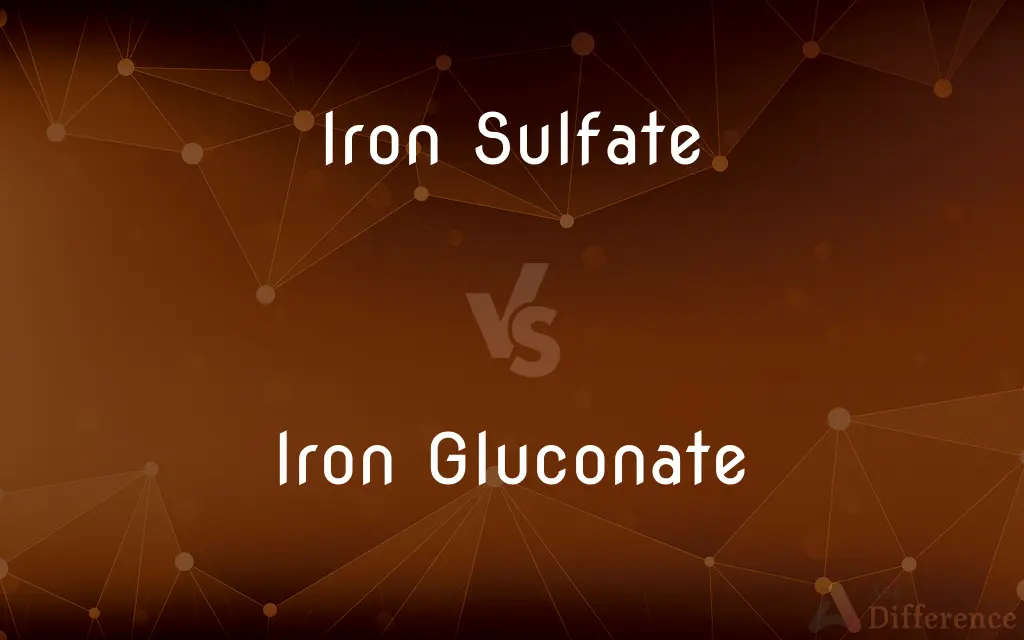Iron Sulfate vs. Iron Gluconate — What's the Difference?
By Tayyaba Rehman — Published on November 22, 2023
Iron Sulfate is a compound with iron and sulfate ions, used as an iron supplement. Iron Gluconate is iron combined with gluconate, also used to treat iron deficiencies but with different absorption and side effects.

Difference Between Iron Sulfate and Iron Gluconate
Table of Contents
ADVERTISEMENT
Key Differences
Iron Sulfate is a widely recognized iron compound, known chemically for its combination of iron and sulfate ions. It’s been extensively utilized in medical settings to combat iron deficiency anemia. In contrast, Iron Gluconate is another medicinal compound that pairs iron with gluconate, aiming for the same purpose but with unique characteristics.
From a chemical standpoint, Iron Sulfate often refers to ferrous sulfate (FeSO₄), with a distinct greenish-blue hue and an acidic taste. Iron Gluconate, on the other hand, is a black compound derived from the reaction between ferrous iron and gluconic acid, offering a different taste and appearance.
When discussing bioavailability, Iron Sulfate is often recognized for its high iron content, making it a preferred choice for rapid iron replenishment. In comparison, Iron Gluconate typically contains less iron but might be preferred due to its gentler impact on the gastrointestinal system.
Both Iron Sulfate and Iron Gluconate are oral iron supplements, but their side effect profiles can vary. While some patients might experience digestive discomfort with Iron Sulfate, they might find Iron Gluconate more tolerable or vice versa.
In environmental applications, Iron Sulfate can be used as a moss control agent in gardens, whereas Iron Gluconate’s primary focus remains its medicinal usage for iron supplementation.
ADVERTISEMENT
Comparison Chart
Chemical Composition
Iron combined with sulfate ions
Iron combined with gluconate
Color
Greenish-blue
Black
Taste
Acidic
Different from Iron Sulfate
Iron Content
Typically higher
Relatively lower
Common Use
Iron supplement & moss control
Primarily as an iron supplement
Compare with Definitions
Iron Sulfate
An acidic-tasting salt derived from the combination of iron and sulfuric acid.
Many recognize iron sulfate by its distinctive acidic taste.
Iron Gluconate
A black compound resulting from iron's reaction with gluconic acid.
Iron gluconate is a common recommendation for those with mild iron deficiencies.
Iron Sulfate
A greenish-blue compound comprising iron and sulfate ions.
The doctor prescribed iron sulfate to treat my anemia.
Iron Gluconate
An alternative to other iron supplements with different absorption rates.
After experiencing side effects, she was transitioned from iron sulfate to iron gluconate.
Iron Sulfate
A compound with high iron content, suitable for rapid iron replenishment.
Due to its high iron content, iron sulfate quickly improved her hemoglobin levels.
Iron Gluconate
A source of iron often used in oral supplements for treating iron-deficient individuals.
The pharmacist suggested iron gluconate for her, considering its effectiveness and gentler nature.
Iron Sulfate
An inorganic salt used as an iron supplement in medicine.
Iron sulfate tablets should be taken with food to avoid stomach upset.
Iron Gluconate
An iron supplement known for its gentler impact on the digestive system.
Due to its mild nature, her doctor switched her to iron gluconate.
Iron Sulfate
A substance used for moss control in gardens and lawns.
She sprinkled iron sulfate in her garden to manage the moss growth.
Iron Gluconate
A medicinal compound containing iron bound to gluconate.
The vegan supplement she bought was fortified with iron gluconate.
Common Curiosities
Why might a doctor prescribe Iron Gluconate instead of Iron Sulfate?
Due to its gentler impact on the gastrointestinal system or based on individual needs.
Which compound has a higher iron content, Iron Sulfate or Iron Gluconate?
Iron Sulfate typically has a higher iron content.
Is Iron Gluconate more gentle on the stomach than Iron Sulfate?
For some individuals, yes, due to its different composition and absorption.
What is the primary use of Iron Sulfate?
It's predominantly used as an iron supplement in medicine.
How are both compounds derived?
Iron Sulfate is from iron and sulfuric acid, and Iron Gluconate is from iron and gluconic acid.
Is Iron Gluconate suitable for vegans?
Yes, it can be found in vegan supplements.
Is the taste of Iron Gluconate and Iron Sulfate similar?
No, Iron Sulfate has an acidic taste, while Iron Gluconate's taste differs.
How do Iron Sulfate and Iron Gluconate differ in absorption?
Their absorption can differ due to their unique compositions, potentially impacting side effects and efficacy.
Can Iron Sulfate be used for purposes other than supplementation?
Yes, it can be used as a moss control agent in gardens.
Are both Iron Sulfate and Iron Gluconate available as oral supplements?
Yes, both are available for oral consumption.
Which compound is typically black in appearance?
Iron Gluconate.
Does Iron Sulfate have environmental applications?
Yes, notably in moss control for gardens.
Which compound might be preferred for rapid iron replenishment?
Iron Sulfate, due to its higher iron content.
Which one is more commonly found in multivitamins?
Both can be found, but the choice often depends on the desired iron content and target population.
Can Iron Gluconate cause side effects?
Yes, like all supplements, it can cause side effects in some individuals.
Share Your Discovery

Previous Comparison
Payback Period vs. Discounted Payback Period
Next Comparison
Sulfite vs. Sulfur TrioxideAuthor Spotlight
Written by
Tayyaba RehmanTayyaba Rehman is a distinguished writer, currently serving as a primary contributor to askdifference.com. As a researcher in semantics and etymology, Tayyaba's passion for the complexity of languages and their distinctions has found a perfect home on the platform. Tayyaba delves into the intricacies of language, distinguishing between commonly confused words and phrases, thereby providing clarity for readers worldwide.












































